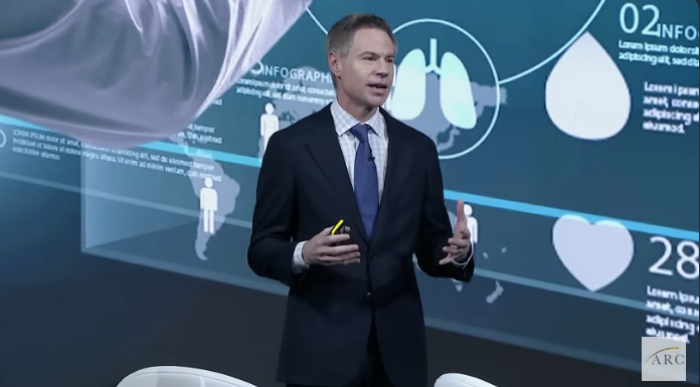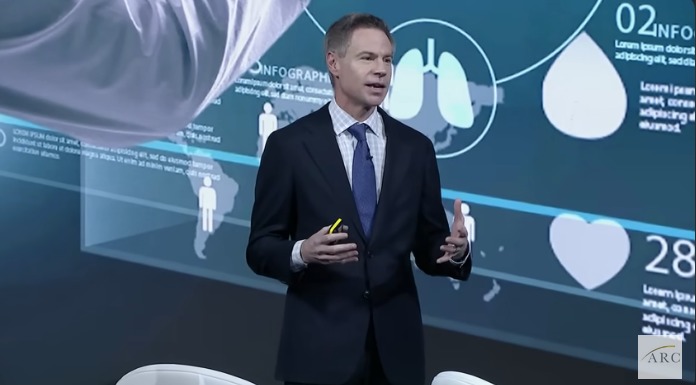‘If there’s no God to hold you accountable for your sins, why not?’

As religious identity continues to decline in the West, what impact will an increasingly godless culture have on the mainstreaming of artificial intelligence?
University of Austin professor and author Michael Shellenberger posed that question at the Alliance for Responsible Citizenship (ARC) 2025 Conference in London on Feb. 18 as some of the world’s leading thinkers, business leaders, and policymakers gathered to craft a vision on “how to formulate and promote the most positive concept of the future that can be imagined,” according to the event’s website.
Shellenberger, 53, delivered a wide-ranging talk on a number of AI-related topics, including its potential for digital identification and its connection to having control over individuals’ lives. In addition to highlighting Japan’s ongoing cultural struggle with youth isolation and social issues, such as video gaming addiction, Shellenberger also pointed to the decline of religious belief in the West and its moral consequences in the face of AI development.
“The percentage of Americans with any religious identity has been decreasing, and the numbers are even more dramatic in Europe, where 80 to 90 percent of Europeans don’t believe in God,” he said. “If there’s no God to hold you accountable for your sins, why not? The problem with disbelieving in God is not that a person ends up believing in nothing; rather, it’s much worse — he ends up believing anything.”
He pointed to the post-World War II era in which threats to speech have seemingly grown not out of a state of war, but of peace, one which, said Shellenberger, has fueled an unprecedented surge of wealthier nations.
“Part of the problem is that we’ve become so peaceful, the older problems have disappeared,” he said. “Fewer and fewer of us are dying in foreign wars, fewer of us are killing each other than ever before, a number that just keeps going down, thankfully. And we’re all much richer than ever before. All around the world, almost everywhere in the world, we’re phenomenally wealthier.
“There’s really hardly anything for kids in the West to look forward to at Christmas time. You can get those gifts all year round. You don’t need to delay your gratification. Maybe the problem is that people are not grounded in a solid set of virtues and morality.”
Adding that such a scenario leads to political ideologies like “changing someone’s gender with drugs and surgeries” or civil policies that stem from “thinking it’s better to let people die on the street from fentanyl than to arrest them for breaking the law,” Shellenberger warned about other threats and how AI fits into them all.
“We also face new fantasies, such as the idea that racism is suddenly increasing in society. The media promotes concepts like white privilege, racial hierarchy, whiteness, and white supremacy, causing panic throughout the population without any basis in reality,” he said. “The biggest victims of this are progressives, particularly progressive women — only 15 percent of whom say they are completely satisfied with their mental health. So, what can be done about it? Can AI play a role?”
Shellenberger said such questions aren’t for the distant future, but for this moment in history, specifically following the election of President Donald Trump and his collaboration with Elon Musk and the Department of Government Efficiency (DOGE) into exposing waste and corruption within the federal government.
While he supports Musk and the DOGE initiative, Shellenberger said there are overriding moral questions behind such efforts that technocrats cannot — or should not — have to answer.
“I admit Elon Musk is a pioneer of AI. Is he using AI to eliminate fraud, waste, and abuse? Yeah, but the decision about what constitutes waste, fraud, and abuse is a human decision,” Shellenberger said. “It’s a subjective question. Are we wasting money by funding sex change surgery in Guatemala, or is that, in fact, a contribution to human flourishing?
“These aren’t decisions that technologists are going to be able to answer.”
Shellenberger also referenced Vice President JD Vance, who, earlier this month, gave a highly publicized speech at the Munich Security Conference in Germany in which he denounced curbs on free speech in various European nations.
In his address, Vance reiterated his position that “the greatest threat in Europe” is European governments sending “millions and millions of unvetted foreign migrants into their countries,” and linked mass illegal immigration with the topic of free speech.
Shellenberger said thanks to Vance, the “Overton window is opening” to such formerly shunned topics.
“Even the BBC is opening itself to disfavored views, and thank heaven for young men finding their testosterone around the world, breaking from the woke orthodoxy, saying masculinity is not toxic,” he said. “Masculinity is natural, healthy and needed. The moralizing men, the woke men, are actually weak men …”
He added that without virtues such as morality or empathy, masculinity can become much like that depicted by popular social media influencer Andrew Tate — “misogynistic, violent, unrestrained in their power.”
“We can strive for something better,” said Schellenberger. “To be gentlemen.”








